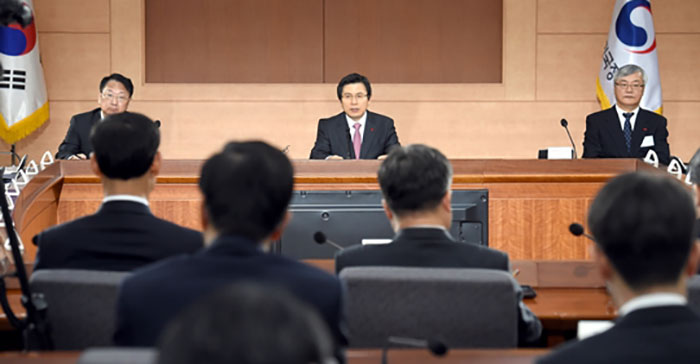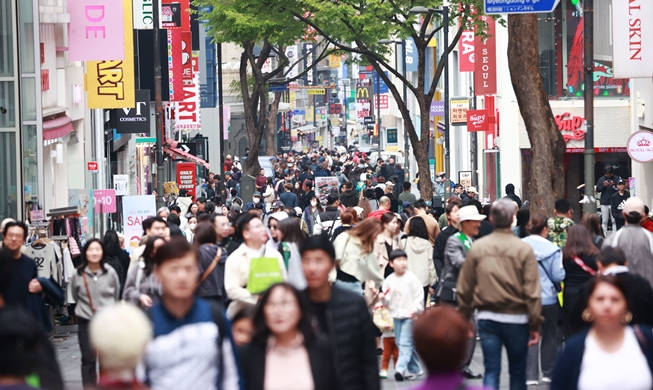-
 Korea.net's 24-hour YouTube channel
Korea.net's 24-hour YouTube channel- NEWS FOCUS
- ABOUT KOREA
- EVENTS
- RESOURCES
- GOVERNMENT
- ABOUT US

Five government bodies outline their policies for 2017 designed to secure driving forces for economic growth, as Acting President Hwang Kyo-ahn (right) presides over a five-ministry briefing session in Seoul on Jan. 6.
New industries backed by state-of-the-art technologies -- in particular, artificial intelligence (AI), information technology (IT) and virtual reality (VR) -- will drive economic growth in Korea throughout 2017.
The Ministry of Culture, Sports and Tourism, the Ministry of Science, ICT and Future Planning, the Ministry of Agriculture, Food and Rural Affairs, the Ministry of Oceans and Fisheries and the Korea Communications Commission outlined the series of policies that they will all pursue in 2017, with the aim of securing economic growth. The policies were announced as Acting President Hwang Kyo-ahn presided over the briefing session in Seoul on Jan. 6.
The culture ministry laid out its yearly policies, which focus on the successful hosting of the PyeongChang 2018 Olympic and Paralympic Winter Games, as well as on the development of digital content.
First and foremost, the ministry will undertake a set of projects so as to make the upcoming Olympic Games a cross-cultural platform. Performances of various genres, like opera and ballet, and a “Trilateral Cultural Olympics" between Korea, China and Japan will take place in the run-up to the PyeongChang Games.
The ministry will complete the construction of 12 new sporting venues, as well as venues for the opening and closing ceremonies, athletes’ quarters and facilities for the press, currently in the final phases of completion. It will also invest about KRW 30 billion into helping boost athletic performances among Olympians from around the world. In addition, it will take into consideration the results from test events that are currently being carried out and which will be held ahead of the Olympic Games, helping it to map out plans on how to educate volunteers and workers and how to host each sporting event more efficiently. The ministry will also spare no expense to beef up its ability to operate the games as a whole.
To make the host city, Pyeongchang in Gangwon-do Province, a place where visitors want to go again, the ministry will increase accommodations in the city, such as traditional Hanok homes, as well as improve facilities designed for the disabled and the elderly.
A total of KRW 160 billion worth of funds will be invested in the production of VR content, the operation of VR hands-on experience facilities and, also, in marketing support, which will amount to around KRW 20 billion of the total. Around KRW 50 billion will be invested in the production of broadcasting and soap operas, as well. The tourism industry, in particular, will further thrive with a string of “Theme Travel” packages the ministry will put onto the market, packages that aim to attract more tourists from both home and abroad to many parts of the country.
The Ministry of Science, ICT and Future Planning announced more investment in research and development (R&D) efforts, for example, supplying funds worth about KRW 127 billion to the development of advanced technologies, like medical devices that run on the Internet of Things (IoT) and related IT. The ministry laid out a plan to develop crucial AI technologies and to, in turn, apply them to the nation’s key services, such as defense, security and education.
The Ministry of Agriculture, Food and Rural Affairs will focus on developing online platforms that will facilitate a more efficient distribution of high-quality food products among consumers. It will expand exports of agricultural goods to more than KRW 10 billion by promoting agricultural materials and brands.
The ministry will also make more efforts to aggressively attract more tourists from both home and abroad by promoting the landscape and traditions inherent to farming villages. It will invest more in developing farming equipment with the help of new technologies, such as drones and the IoT, as an effort to foster new industries.
The Ministry of Oceans and Fisheries, meanwhile, will pursue the goal of reaching the "2 million mark,” meaning the number of tourists who arrive in Korea on a cruise ship in 2017, and it plans to improve related infrastructure, such as cruise terminals. More efforts will be focused on developing better navigation systems that use more high tech, AI-based unmanned vessels and underwater construction robots, too.

Acting President Hwang Kyo-ahn (center) presides over a government briefing session on Jan. 6 in Seoul, as the government bodies present their plans to secure economic growth in 2017.
By Sohn JiAe
Korea.net Staff Writer
Photos: Yonhap News, Prime Minister’s Office
jiae5853@korea.kr
Most popular
- First hearing-impaired K-pop act hopes for 'barrier-free world'
- 'Mad Max' director impressed by 'cinema-literate' Korean viewers
- Romanian presidential couple visits national cemetery
- 'Korean mythology is just as wonderful as Greek and Roman'
- Hit drama 'Beef' wins awards from 3 major Hollywood guilds













